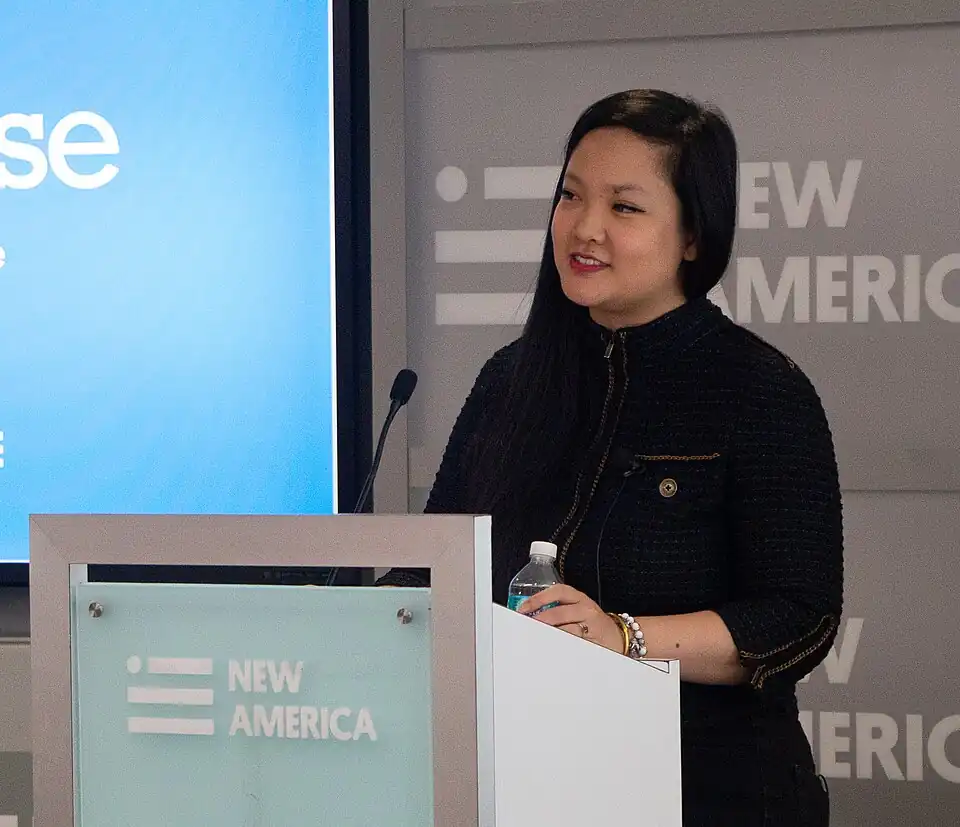Photo: Amanda Nguyen; via Wikipedia.
Coming forward about sexual abuse or assault takes incredible courage. But for many survivors, choosing to speak up has led to more than justice and accountability. Sharing their stories also contributed to healing, empowerment, and societal and legislative change. These stories are a reminder that, while the legal system and society still have far to go, meaningful victories are possible. They also send a clear message: survivors are not alone, and speaking up can lead to real outcomes.
Legal Accountability and Compensation
One of the most significant examples is the record-breaking $4 billion settlement for survivors of sexual abuse at Los Angeles County juvenile facilities. Nearly 7,000 survivors shared their stories and filed claims, helping to expose the systemic abuse and cover-ups inside county-run detention centers. Their voices not only led to financial compensation but also prompted long-overdue public awareness and policy reforms.
In another high-profile case, hundreds of women came forward to expose former USA Gymnastics doctor Larry Nassar, whose abuse went unchecked for decades. Their combined testimony led to multiple prison sentences for Nassar and nearly $900 million in total settlements from Michigan State University, USA Gymnastics, and the U.S. Olympic Committee. These survivors were instrumental in changing how athletic organizations handle abuse. (More on this story below.)
The Boy Scouts of America scandal revealed decades of child sexual abuse across the country. Through persistent survivor advocacy, a $2.46 billion settlement trust was established, marking one of the largest sexual abuse settlements in U.S. history. Survivors also fought for transparency and public release of internal abuse records, helping others understand the breadth of institutional failure.
Aly Raisman: Olympic Champion & Survivor Advocate
Sometimes the greatest impact of coming forward is felt outside the courtroom.
Six-time Olympic medalist and USA Women’s Gymnastics team captain Aly Raisman, in recent years, has been one of the most visible voices pushing sports institutions to protect athletes. Raisman, who won two golds in the 2012 London Games and one in the 2016 Rio Games, testified in the Larry Nassar scandal.
Nassar, the former USA Gymnastics and Michigan State University doctor, sexually abused hundreds of girls and young women over decades, often under the guise of medical treatment. After a federal conviction for child-sexual-abuse material, he received 60 years, then state sentences of 40–175 years for criminal sexual conduct. The case exposed systemic failures at USA Gymnastics, MSU, and the U.S. Olympic & Paralympic Committee, and a botched FBI response, leading to public hearings and leadership changes. Raisman publicly disclosed her abuse in a 60 Minutes interview in 2017, and delivered a powerful victim-impact statement during Nassar’s sentencing hearings in Michigan the following year. Raisman’s statement and those of more than 150+ other survivors, was influential at Nassar’s sentencing.
Raisman continued to advocate publicly for survivor-centered policies in gymnastics and beyond, speaking before lawmakers and urging independent oversight. Through public education, partnerships with survivor organizations, and mentoring younger athletes, Raisman keeps the focus on prevention, accountability, and trauma-informed support. Her advocacy helps turn individual testimony into lasting reforms that make sport safer for everyone. Her 2021 documentary, Darkness to Light (watch the trailer) detailed her healing journey, showing that recovery is ongoing, and that helping others can be a source of strength.
Lavinia Masters: Rape Kit Reform Leader
Lavinia Masters was raped at age 13, and her rape kit sat untested for over 20 years. She later discovered that the statute of limitations had expired, preventing her from pursuing justice. Instead of staying silent, she became a leading advocate for rape kit reform. Her efforts helped pass a Texas law requiring labs to test kits within 90 days. The legislation would result in a national conversation about ending the rape kit backlog and how survivors are often ignored.
Amanda Nguyen’s story also led to major reform. After facing barriers in preserving her rape kit and pursuing justice, she drafted the federal Sexual Assault Survivors’ Bill of Rights. Her law passed unanimously in Congress and has become a model for survivor rights legislation across the country. She later founded Rise, a nonprofit dedicated to protecting civil rights for sexual assault survivors.
Advocacy and Empowerment
Angela Rose was abducted and sexually assaulted at age 17. Instead of being silenced, she advocated for justice, helped secure her attacker’s conviction, and founded PAVE (Promoting Awareness, Victim Empowerment). Today, the organization runs prevention programs in schools and colleges, equipping the next generation to speak out against sexual violence.
Survivor advocate Kimberly Corban was 20 when she was raped by a stranger in her college apartment. After helping identify and convict her attacker, she made the bold decision to speak publicly about her experience. She now travels the country sharing her story, helping others understand the power of using your voice and refusing to let fear define you.
“Being victimized is never a choice, but becoming a survivor can be.” — Kimberly Corban; via KimberlyCorban.com.
Summary
These stories represent just a handful of the thousands of survivors who have come forward, not only to seek justice for themselves, but to help prevent abuse from happening to others. Speaking up doesn’t guarantee a perfect outcome. But for many, it’s been the first step toward reclaiming their power, receiving compensation for therapy and healing, and transforming trauma into action. If you’re thinking about coming forward, know that you don’t have to walk that road alone. Legal support (see the form below) and financial compensation are possible, and lots of healing resources exist. Your voice has the power to make a difference.
